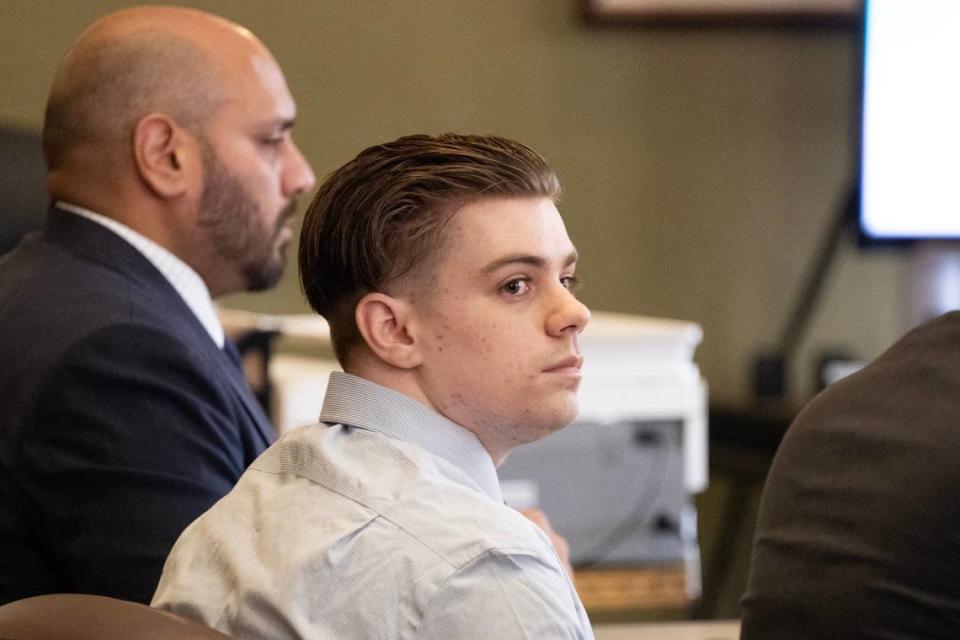‘Demon of addiction’: Arguments begin in Northern California’s first fentanyl murder trial
A “demon of addiction” roared inside a 20-year-old Rocklin native on fatherhood’s precipice — and despite knowing fentanyl’s deadly nature, a drug dealer provided the synthetic opiate that claimed his life, a prosecutor argued as Northern California’s first fentanyl-related homicide trial began Tuesday.
Carson Schewe, 22, has pleaded not guilty to murder and two drug charges in connection to the death of Kade Kristopher Webb, 20, who died in December 2021 at a Safeway on Roseville’s Sierra Boulevard. His defense attorneys said during opening statements he’s guilty of selling drugs but argued there’s no malice to support homicide.

The case marked the first time Placer County prosecutors filed a murder charge in a fatal fentanyl-related overdose and first jury trial stemming from those charges in Northern California.
As fentanyl overdoses skyrocketed in Placer County, District Attorney Morgan Gire has been among the first to file murder charges against fentanyl dealers. Sgt. David Smith, a spokesman for the Placer County Sheriff’s Office, said there were 40 victims in 2022 and at least 39 deaths in 2023; tests for every victim 2023 haven’t been completed and could increase by a few, Smith said.
Gire has secured plea deals from other synthetic opiate suppliers who bypassed a jury trial, which includes California’s first fentanyl-homicide conviction.
The evidence: Text messages, social media videos
Webb’s parents — who watched the trial at Placer Superior Court in Auburn — tried to help their son before he died, Placer County Deputy District Attorney Devan Portillo said in his opening statements.
The 20-year-old was freshly released from a rehab facility days before fentanyl took his life on Dec. 3, 2021, Portillo said. Several family members, filling two rows in the gallery, wiped tears as Portillo flashed Webb’s dead body on a screen.
Schewe and Webb had met up hours before his death, which Portillo said was proven by Uber records. Minutes before meeting, Schewe made a video showing pills in a Ziploc baggie, which potentially contained the narcotic that killed Webb, Portillo said.
To prove a murder charge, Portillo said he would show Schewe knew about the synthetic opiate’s lethal toxicity but didn’t care.
“Knowledge is key here,” Portillo said.
A friend who called Schewe asking about Webb’s whereabouts told investigators that Schewe had refused to sell Webb drugs because the victim had gotten back from rehab.
“That’s going to become important in terms of knowledge,” Portillo said. It’s knowing how fentanyl affects the body, a victim’s tolerance levels and how certain doses can affect bodies, he said.
Fentanyl deaths’ growing toll
Deaths from fentanyl overdose have soared in Placer County in recent years — a fact that Schewe was personally affected by and proves he knew about its dangers, Portillo said.
In 2019, there were three deaths related to fentanyl. By 2021, the number of victims increased to 32. Schewe’s girlfriend and close friend died from fentanyl-related overdoses, Portillo said, suggesting the defendant knew of the drug’s toxicity.
“I lose a friend every month,” Schewe wrote in the text messages shown to jurors by Portillo.
His own mother and friend accused him of supplying narcotics that killed them, Portillo said, showing text messages reflecting the accusation. Schewe himself also overdosed on drugs, he said.
Schewe denied the accusations, according to the text message shown to the jury.
“You think that would be enough, but there’s more,” Portillo said.
Despite grappling with the deaths of those close to him, Schewe began selling drugs again after Webb died, Portillo said. Even after his friends died and Schewe overdosed, Portillo said the defendant bragged about selling fentanyl and flashed piles of money.
Public defender Brad Whatcott, who’s arguing the case with co-counsel Rohan Beesla, cast doubt that Schewe supplied the drug that killed Webb. He said he would also call a defense witness, a doctor, who would question if fentanyl toxicity caused Webb’s death.
Whatcott added he would show that Schewe was destitute and homeless despite the wads of cash he flashed on Snapchat videos, attempting to rebut the prosecution’s claim the defendant is callous.
Prosecutors under Gire have made fentanyl-related deaths a priority and have already notched two convictions, under plea deals, for similar crimes.
Nathaniel Cabacungan, 22, was the first man convicted in California for furnishing the deadly drug to Jewels Wolf, 15, of Roseville. He was sentenced in October 2023 to 15 years to life while represented by Whatcott, the public defender.
Fair Oaks man Aaron Kurtis Dare II pleaded guilty in December to the second-degree murder of a 25-year-old Auburn woman. He is scheduled to be sentenced Thursday.
Riverside County prosecutors said a jury last year convicted a man of second-degree murder in the fentanyl-overdose death of a 26-year-old woman, the first time a jury handed down such a decision in California.
Schewe’s trial is expected to last for about a week. Portillo is scheduled to call on Webb’s friend, girlfriend, doctors, criminalists, Placer County sheriff’s deputies and Schewe’s mother to testify.

